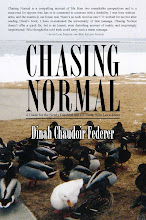What would you do if you or a loved one woke up tomorrow with a disability? How would you cope if you couldn’t do what you loved best in your spare time? How would you know what to do if someone you loved needed your emotional support following the on-set of a new disability?
These questions are quite fear provoking and yet very real. Given that we have soldiers coming home daily with permanent disabilities, these questions are multiplying exponentially in our country.
Chasing Normal: A Guide for the Newly Disabled and Those Who Love Them provides a type of map and answers these questions and more. In this book Dinah Chaudoir Federer discusses "Talking about the ‘Big IT’", "Silently Screaming"-dealing with fear, "Feeding Your Spirit", "Releasing Resistance" and other easy to follow topics. It’s written conversationally rather than formally to make it less threatening.
Chasing Normal: A Guide for the Newly Disabled and Those Who Love Them is meant to help the newly disabled especially, and their families calm down, get centered and take their individual journey one step at a time. As she says in her book, becoming disabled is like being dropped in the middle of a foreign country and told to find your way home. Chasing Normal is meant to act as a compass on this often overwhelming path.
If you do a topic search you’ll see there are plenty of textbooks discussing the "issues", there are many written by parents, and there are some personal stories. Dinah's experience can tell you that the "average Joe" in crisis will not read a textbook. Concentration flies out the window when you’re terrified. Further, this same "Joe" won’t care about a parent’s theory or even others’ stories unless there’s some good, simple advice. Chasing Normal: A Guide for the Newly Disabled and Those Who Love Them will do this without adding to their overwhelm.
Dinah has worked in the field of rehabilitation for 20 years, and is currently a vocational rehabilitation counselor for the disabled. She was born with Charkot-Marie-Tooth (CMT), an inherited neurological condition that affects the nerves and weakens the muscles in the extremities, forcing her to walk with crutches. At age 35, she was diagnosed with Trigeminal Neuralgia, which causes intense electrical shock-type pain in the nose, lips, and eyes. Consequently, she has unique insight into the experiences of those who grow up with a disability as well as what people go thru when they acquire a disability later in life.As a disabled adult herself, her on-going message is blunt and hopeful: THERE IS LIFE AFTER DISABILITY AND IT DOESN’T HAVE TO SUCK!!
